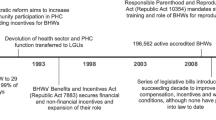Abstract
Uganda has high incidence rates of cervical cancer (47.5/100,000/year) due to limited screening access. In settings where men hold most of the decision-making power, they play an important role in women’s uptake of cervical cancer screening. We aimed to capture men’s knowledge, beliefs and perspectives about cervical cancer, community-based screening and health system barriers. Focus group discussions were conducted with men in rural Uganda. Data were verbatim translated and transcribed into English. Transcripts were analysed in ATLAS.ti using a deductive approach of thematic content analysis and applied to an implementation research framework. Twenty-three men participated in focus groups. Men held poor knowledge of cervical cancer, its causes and treatment. Men felt screening would be acceptable by women if men and women were educated. Men highlighted health system barriers to accessing screening including: 1) poor-quality health services, 2) large distances to facilities/lack of affordable transportation and 3) lack of health workers/mistreatment by health workers. Men described supporting women through assisting with transportation, psychosocial support and sharing information. They requested services for men to be decentralized alongside community outreaches for cervical cancer screening. Engaging men in the implementation, education and planning of community-based cervical cancer screening programs is critical. Not engaging men is a missed opportunity to provide them with services and education. Concerted efforts must be made in educating men and reducing health system barriers to ensure rural women receive cervical cancer screening and follow-up care in low-income settings. Clinicaltrials.gov, NCT04000503; Registered 27 June 2019.
Similar content being viewed by others
References
World Health Organization (2020) Global strategy to accelerate the elimination of cervical cancer as a public health problem. Available at: https://www.who.int/publications-detail-redirect/9789240014107. Accessed Dec 2020
Morgan R, Ayiasi RM, Barman D et al (2018) Gendered health systems: evidence from low- and middle-income countries. Health Res Policy Syst 16(1):58. https://doi.org/10.1186/s12961-018-0338-5
Binka C, Doku DT, Nyarko SH, Awusabo-Asare K (2019) Male support for cervical cancer screening and treatment in rural Ghana. PLoS ONE 14(11):e0224692. https://doi.org/10.1371/journal.pone.0224692
Lewis S, Moucheraud C, Schechinger D, et al (2020) “A loving man has a very huge responsibility”: A mixed methods study of Malawian men’s knowledge and beliefs about cervical cancer. BMC Public Health 20:1494. https://doi.org/10.1186/s12889-020-09552-1
World Health Organization, Regional Office for Africa (2014) Uganda launches the national male involvement strategy and guidelines. Available at: https://www.afro.who.int/news/uganda-launches-national-male-involvement-strategy-and-guidelines. Accessed Dec 2020
Rosser JI, Zakaras JM, Hamisi S, Huchko MJ (2014) Men’s knowledge and attitudes about cervical cancer screening in Kenya. BMC Womens Health 14:138. https://doi.org/10.1186/s12905-014-0138-1
Moses E, Pedersen HN, Wagner EC et al (2018) Understanding Men’s Perceptions of Human Papillomavirus and Cervical Cancer Screening in Kampala. Uganda J Glob Oncol 4:1–9. https://doi.org/10.1200/JGO.17.00106
World Health Organization (2014) Comprehensive cervical cancer control: A guide to essential practice - Second edition. Available at: http://www.who.int/reproductivehealth/publications/cancers/cervical-cancer-guide/en/. Accessed Dec 2020
Rujumba J, Ndeezi G, Nankabirwa V, et al. “If I have money, I cannot allow my baby to breastfeed only …” barriers and facilitators to scale-up of peer counselling for exclusive breastfeeding in Uganda. Int Breastfeed J 2020; 15(1): 43https://doi.org/10.1186/s13006-020-00287-8
UNICEF (2016) Improving Male Involvement to Support Elimination of Mother-to-Child Transmission of HIV in Uganda: A Case Study. Available at: https://www.childrenandaids.org/sites/default/files/2017-03/Uganda%20Case%20Study%203_15%20HR_0.pdf. Accessed Dec 2021
Gopal P, Fisher D, Seruwagi G, Taddese HB (2020) Male involvement in reproductive, maternal, newborn, and child health: evaluating gaps between policy and practice in Uganda. Reprod Health 17(1):114. https://doi.org/10.1186/s12978-020-00961-4
Turiho AK, Okello ES, Muhwezi WW, Katahoire AR (2017) Perceptions of human papillomavirus vaccination of adolescent schoolgirls in western Uganda and their implications for acceptability of HPV vaccination: a qualitative study. BMC Res Notes 10 https://doi.org/10.1186/s13104-017-2749-8
Williams MS, Amoateng P (2012) Knowledge and beliefs about cervical cancer screening among men in Kumasi. Ghana Ghana Med J 46(3):147–151
Adewumi K, Oketch SY, Choi Y, Huchko MJ (2019) Female perspectives on male involvement in a human-papillomavirus-based cervical cancer-screening program in western Kenya. BMC Womens Health 19(1):107. https://doi.org/10.1186/s12905-019-0804-4
Mitchell SM, Pedersen HN, Sekikubo M, et al (2016) Strategies for Community Education Prior to Clinical Trial Recruitment for a Cervical Cancer Screening Intervention in Uganda. Front Oncol 6 https://doi.org/10.3389/fonc.2016.00090
Rawat A, Sanders C, Mithani N et al (2021) Acceptability and preferences for self-collected screening for cervical cancer within health systems in rural Uganda: A mixed-methods approach. Int J Gynecol Obstet 152(1):103–111. https://doi.org/10.1002/ijgo.13454
Ganle JK, Dery I (2015) ‘What men don’t know can hurt women’s health’: a qualitative study of the barriers to and opportunities for men’s involvement in maternal healthcare in Ghana. Reprod Health 12(1):93. https://doi.org/10.1186/s12978-015-0083-y
Doyle K, Levtov RG, Barker G et al (2018) Gender-transformative Bandebereho couples’ intervention to promote male engagement in reproductive and maternal health and violence prevention in Rwanda: Findings from a randomized controlled trial. van Wouwe JP, ed. Plos One 13(4):e0192756. https://doi.org/10.1371/journal.pone.0192756
Nakisige C, Trawin J, Mitchell-Foster S, et al (2020) Integrated cervical cancer screening in Mayuge District Uganda (ASPIRE Mayuge): a pragmatic sequential cluster randomized trial protocol. BMC Public Health 20:142. https://doi.org/10.1186/s12889-020-8216-9
Ndejjo R, Mukama T, Musabyimana A, Musoke D (2016) Uptake of Cervical Cancer Screening and Associated Factors among Women in Rural Uganda: A Cross Sectional Study. PLoS ONE 11(2): e0149696. https://doi.org/10.1371/journal.pone.0149696
Uganda AIDS Commission (2021) HIV Fact Sheet 2020. Available at: https://uac.go.ug/index.php?option=com_content&view=article&id=21:hiv-prevention-111&catid=8&Itemid=10. Accessed Feb 2021
ATLAS.ti n.d. Scientific Software Development GmbH. Available at: https://atlasti.com/. Accessed Feb 2021
Heath H, Cowley S (2004) Developing a grounded theory approach: a comparison of Glaser and Strauss. Int J Nurs Stud 41(2):141–150. https://doi.org/10.1016/S0020-7489(03)00113-5
Damschroder LJ, Aron DC, Keith RE, Kirsh SR, Alexander JA, Lowery JC (2009) Fostering implementation of health services research findings into practice: a consolidated framework for advancing implementation science. Implement Sci 4(1):50. https://doi.org/10.1186/1748-5908-4-50
Buchanan Lunsford N, Ragan K, Lee Smith J, Saraiya M, Aketch M (2017) Environmental and Psychosocial Barriers to and Benefits of Cervical Cancer Screening in Kenya. Oncologist 22(2):173–181. https://doi.org/10.1634/theoncologist.2016-0213
Acknowledgements
We would like to thank the men who participated in our study for sharing their insights and time, as well as the community health workers who helped organize this research.
Funding
This study was funded by the Canadian Institutes of Health Research (CIHR). CIHR played no role in or had authority over the study design; collection, management, analysis and interpretation of data; writing of the report; or the decision to submit for publication.
Author information
Authors and Affiliations
Contributions
Dr. Carolyn Nakisige was the local PI and oversaw the intervention and together with Dr. Angeli Rawat conceptualized, designed and implemented the study. Material preparation, data collection and analysis were performed by Dr. Angeli Rawat, Dr. Carolyn Nakisige and Ms. Ruth Namugosa. The first draft of the manuscript was written by Dr. Angeli Rawat, Ms. Nadia Mithani and Ms. Catherine Sanders and all authors commented on previous versions of the manuscript. All authors read and approved the final manuscript.
Corresponding author
Ethics declarations
Ethics Approval
All aspects of the study were approved by the University of British Columbia Children and Women’s Research Ethics Board (H17-01593) and the Uganda Cancer Institute Ethics Review Board (UCIREC REF-02–2017). The procedures used in this study adhere to the tenets of the Declaration of Helsinki.
Consent to Participate
Informed consent was obtained from all individual participants included in the study.
Competing Interests
The authors declare no competing interests.
Additional information
Publisher's Note
Springer Nature remains neutral with regard to jurisdictional claims in published maps and institutional affiliations.
Rights and permissions
About this article
Cite this article
Rawat, A., Mithani, N., Sanders, C. et al. “We Shall Tell them with Love, Inform them what we have Learnt and then Allow them to go” - Men’s Perspectives of Self-Collected Cervical Cancer Screening in Rural Uganda: A Qualitative Inquiry. J Canc Educ 38, 618–624 (2023). https://doi.org/10.1007/s13187-022-02163-x
Accepted:
Published:
Issue Date:
DOI: https://doi.org/10.1007/s13187-022-02163-x




